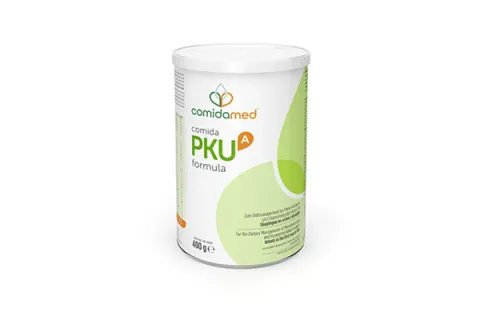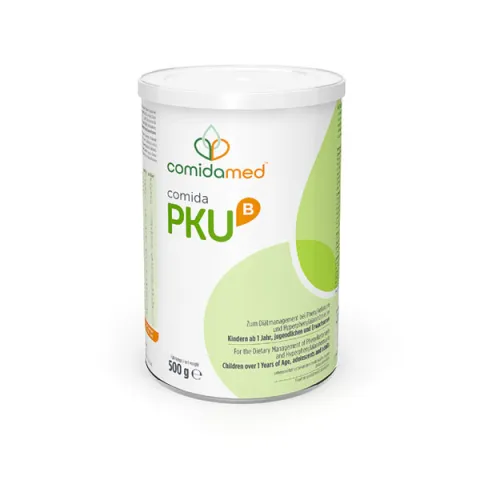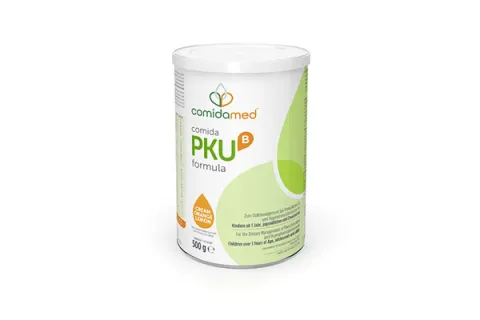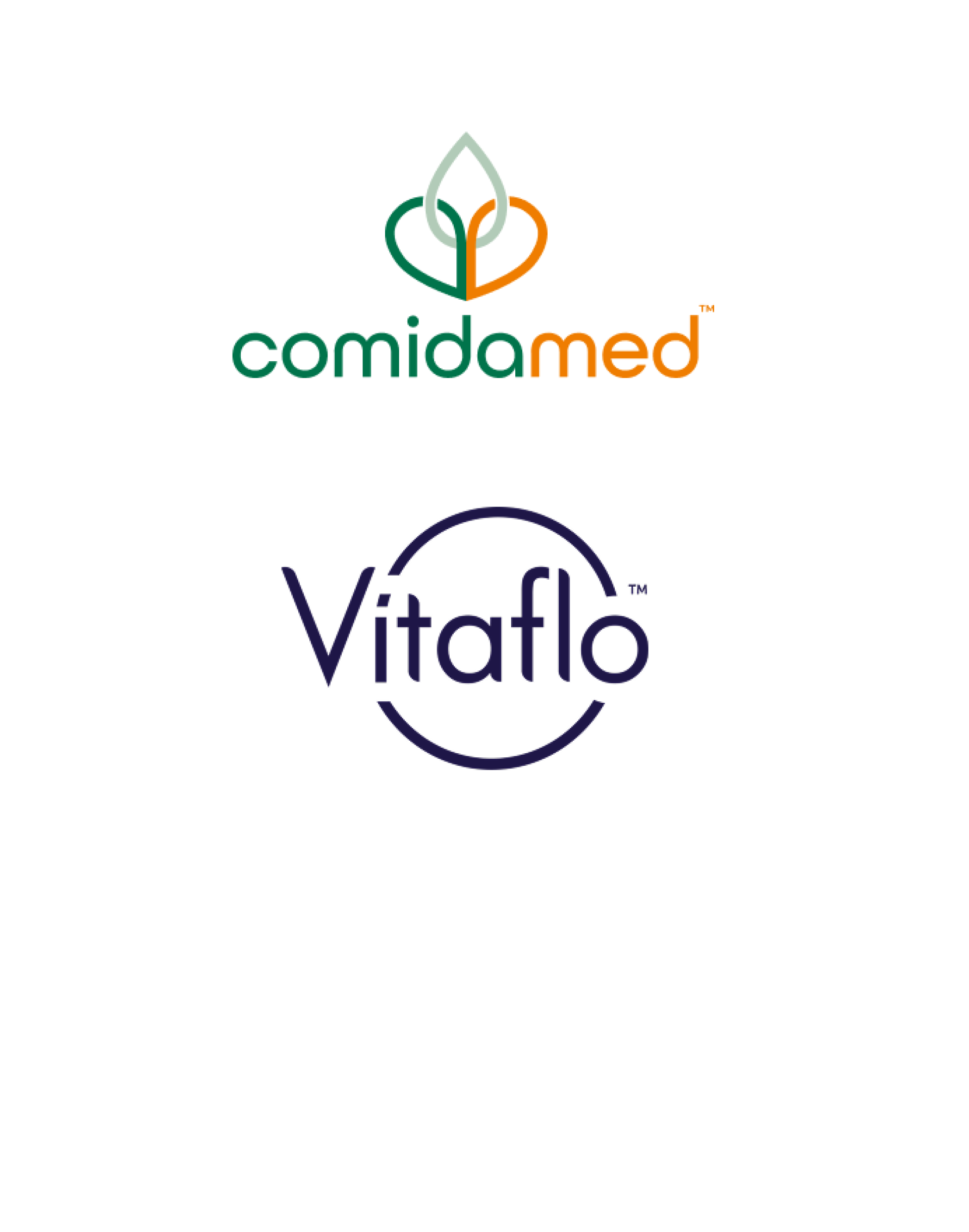Phenylketonuria (PKU)
The following information provides a general overview of Phenylketonuria and is intended for educational purposes only. It should not replace guidance from qualified healthcare professionals. Vitaflo™ International Limited accepts no responsibility for any loss resulting from reliance on the content. For comprehensive and up-to-date recommendations, please refer to national and international clinical guidelines.
What is Phenylketonuria?
Phenylketonuria (PKU) is a group of recessively inherited, autosomal disorders of protein metabolism, characterised by a deficiency of the enzyme phenylalanine hydroxylase (PAH)1.
PKU is sometimes referred to as Phenylalanine hydroxylase deficiency - this term also covers milder cases of hyperphenylalaninaemia (raised phenylalanine levels in the blood).
What is the cause of Phenylketonuria?
Phenylketonuria (PKU) is caused by a deficiency of the enzyme phenylalanine hydroxylase (PAH)1. PAH is necessary for the conversion of the essential amino acid phenylalanine to tyrosine.
*Note: you may find our Phenylketonuria (PKU) condition-specific resource helpful. This is intended for use with patients and families to explain the complex science behind the inheritance of PKU, diagnosis and management.
You can also direct your patients onto this site to read the same information.
For further information on resources available, please enquire: Contact page
What are the symptoms of PKU?
Raised blood phenylalanine levels and other metabolites
Early manifestations of PKU include microcephaly, irreversible developmental delay, intellectual disability and seizures1-2.
Low blood tyrosine levels
Inadequate production of tyrosine can cause impaired neurotransmitter production and melanin deficiency1, resulting in a characteristically pale complexion.
Testing for Phenylketonuria: newborn screening
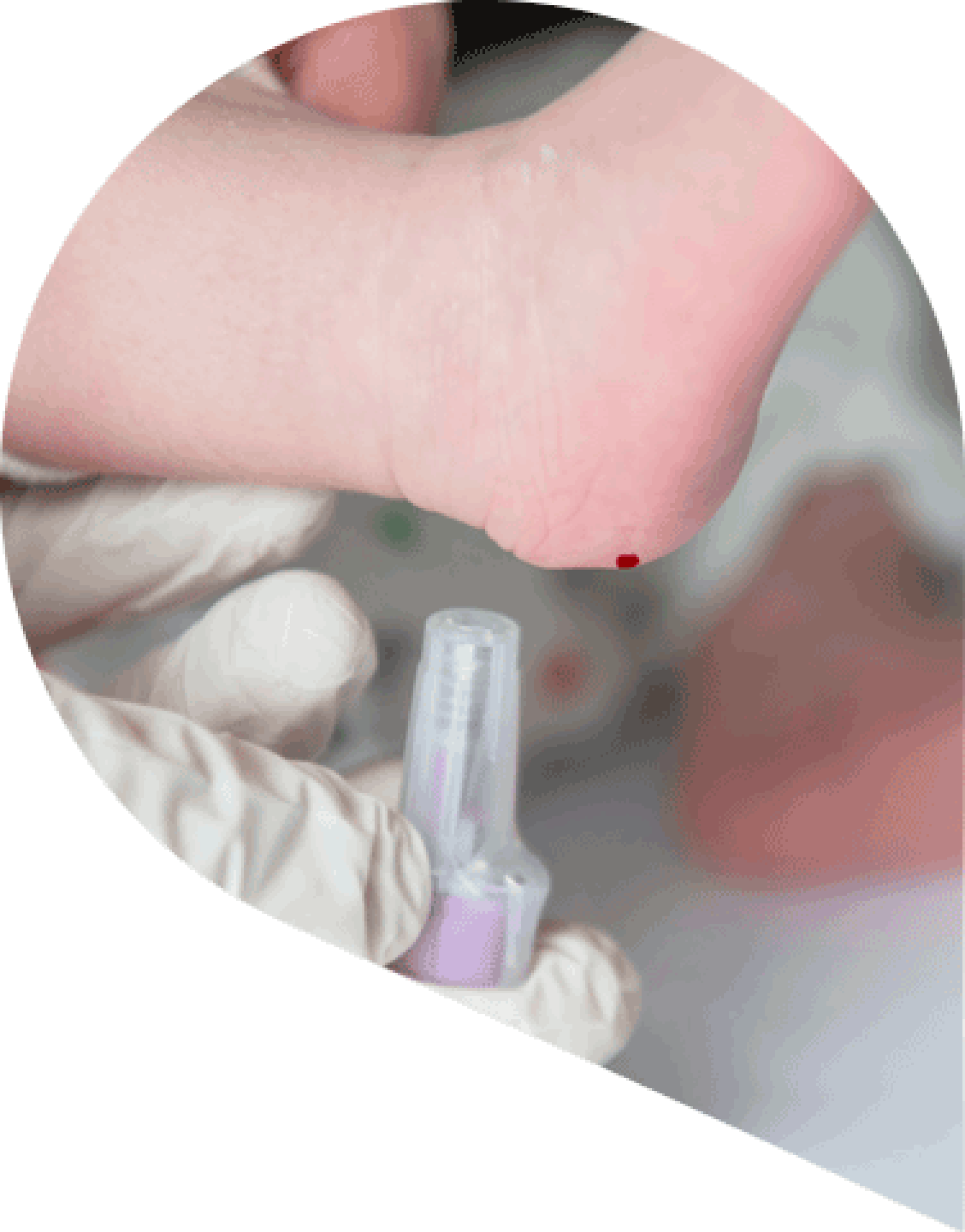
Almost all cases of Phenylketonuria (PKU) are diagnosed following a positive newborn screening (NBS) test, except in some countries where NBS is not established1.
Early detection and management of PKU via NBS leads to improved outcomes, with many attaining normal development, education, and independence3. The devastating presentation of untreated PKU is now rarely seen in countries using NBS.
It is strongly advocated that dietary management is initiated as soon as possible, ideally within the first few weeks of life, to get blood phenylalanine within the acceptable treatment range as soon as possible1-2.
How common is Phenylketonuria?
Phenylketonuria is a rare condition; however, it is the most common inborn error of protein metabolism, with a global incidence rate of 1 in 10,000 - 12,0003-4.
What are the symptoms of Phenylketonuria (PKU)?
If Phenylketonuria (PKU) is untreated, there is an accumulation of phenylalanine in the blood and brain. Early manifestations of PKU include microcephaly, irreversible developmental delay, intellectual disability and seizures2-3.
However, if patients are diagnosed promptly and dietary management is introduced early, these symptoms can be prevented1-2, and life expectancy should be the same as the healthy population.
How is Phenylketonuria managed?
It is widely accepted that dietary management for Phenylketonuria (PKU) is the first-line standard of care and results in normal growth and development through infancy and beyond; however, there are new emerging pharmaceutical treatments which may not be available in all countries1-2. Dietary management should be lifelong, with published international guidelines advocating a ‘diet for life’ approach1-3,5-6.
The primary aim of dietary management in PKU is to achieve good metabolic control by reducing blood phenylalanine (phe) levels to within recommended target levels1-2.
There are four main components of the dietary management of PKU:
- Avoidance of high protein foods
- A measured amount of phe according to patient tolerance
- Low-protein foods
- Protein substitutes
Avoidance of high-protein foods
High levels of phenylalanine (phe) are present in many foods that contain protein, such as:
- Meats
- Fish
- Eggs
- Nuts
- Milk
- Dairy products
- Soya
- … and many more.
To help keep phe levels within target range, protein intake must be restricted in people with PKU, which means avoiding high protein foods.
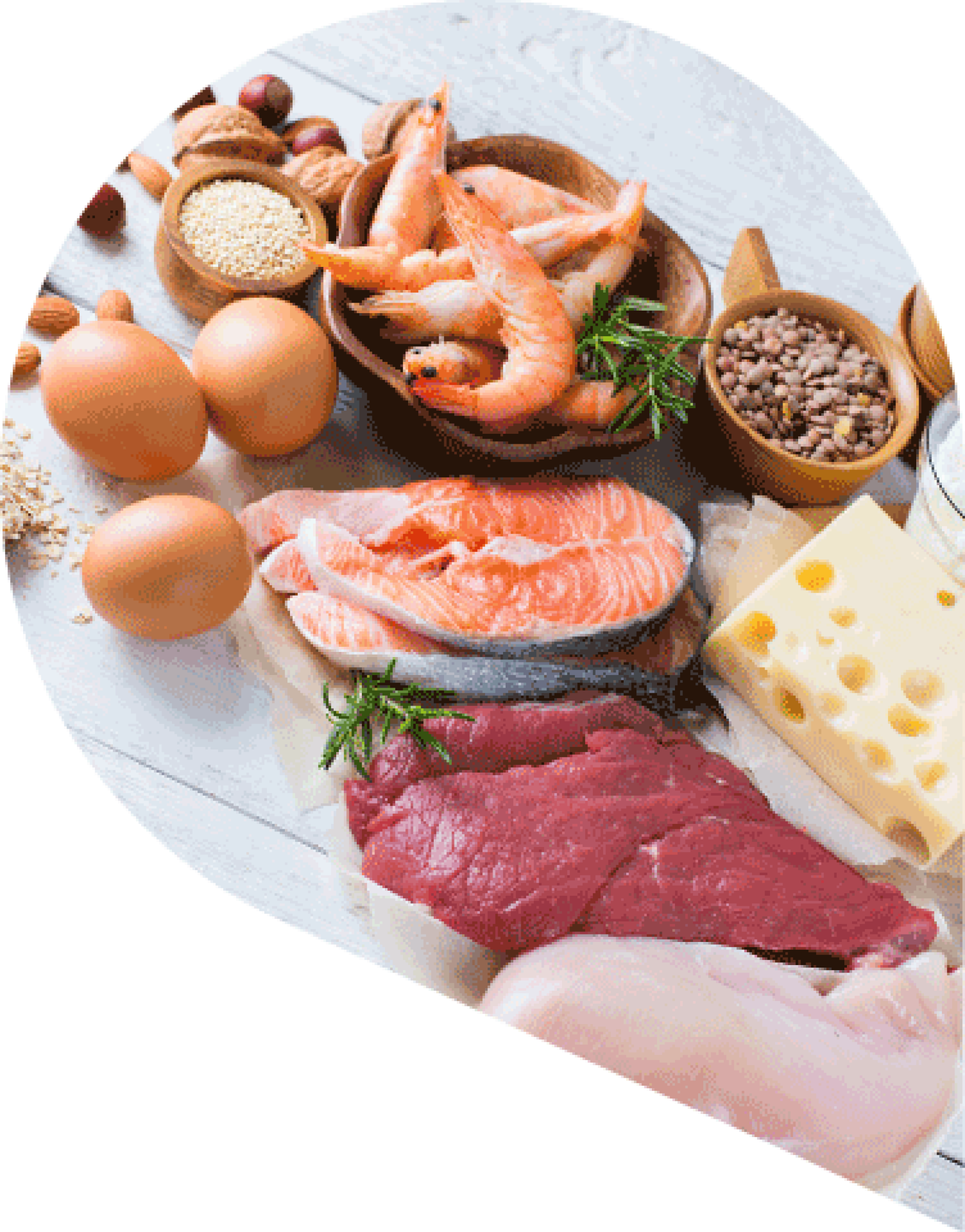
Examples of high protein foods
A measured amount of phenylalanine according to patient tolerance
As phe is an essential amino acid, a small, measured amount of phe from foods must be included in the diet to prevent deficiency.
The amount of phe that an individual with PKU can safely consume, whilst achieving their target blood phe levels, is known as protein tolerance and will vary from individual to individual.
The system used to ensure an adequate phe intake, without exceeding tolerance, varies from country to country. Often, a phe or protein exchange system is used, which helps to categorise and count foods according to their phe content (such as checking the nutritional information or the ingredients). An example is a phenylalanine exchange or allowance system.
Low protein foods
As well as avoiding high protein foods, incorporating low protein foods into the diet is equally essential for the dietary management of PKU.
They can be foods naturally low in protein, such as most fruits and some vegetables, fats, oils, and many high-sugar foods. Specially manufactured foods, such as bread, milk alternatives, flour mixes, pasta and rice, subject to availability, can also be used.
These types of foods can help provide increased variety, energy, and a sense of normality to patients’ diets, allowing for versatility in meals and flavours across the week.

Protein substitutes
Although natural protein tolerance varies in PKU, total protein requirements are like those of individuals without the disorder.
Total protein requirements will not be met by the small amount of natural protein that PKU patients would consume through their diet.
Therefore, to help achieve adequate protein intakes, products called protein substitutes are essential. They provide a suitable phe free protein source and ensure all other essential amino acids and nutrients are supplied to support normal protein synthesis for growth and development1,6. Typically, most PKU patients consume their protein substitute with meals, spread evenly throughout the day.
How is Phenylketonuria managed in infancy?
Dietary management is ideally started as early as possible following diagnosis, to reduce blood phenylalanine (phe) levels to target ranges as quickly as possible1-2.
This will involve balancing intakes of breast milk or standard infant formula (which provides phe), with a phe free formula for infants, to achieve good metabolic control, meet nutritional requirements and optimise growth1,6.
Breastfeeding offers many benefits to mothers and infants, and a family should be supported in making the appropriate choice for their family, if deemed appropriate by the metabolic healthcare team.
A specialist metabolic team should be responsible for the management of the individual with PKU from diagnosis and throughout life.
You may find the following resource helpful.
- van Wegberg AMJ, MacDonald A, Ahring K, Bélanger-Quintana A, Beblo S, Blau N, et al. European guidelines on diagnosis and treatment of phenylketonuria: first revision. Mol Genet Metab. 2025;144:109125. https://doi.org/10.1016/j.ymgme.2025.109125
- Smith WE, Berry SA, Bloom K, Brown C, Burton BK, Demarest OM, et al. Phenylalanine hydroxylase deficiency diagnosis and management: a 2023 evidence-based clinical guideline of the American College of Medical Genetics and Genomics (ACMG). Genet Med. 2025;27:101289. https://doi.org/10.1016/j.gim.2024.101289
- van Wegberg AMJ, MacDonald A, Ahring K, Bélanger-Quintana A, Blau N, Bosch AM, et al. The complete European guidelines on phenylketonuria: diagnosis and treatment. Orphanet J Rare Dis. 2017;12:162. https://doi.org/10.1186/s13023-017-0685-2
- Hillert A, Anikster Y, Bélanger-Quintana A, Burlina A, Burton BK, Carducci C, et al. The genetic landscape and epidemiology of phenylketonuria. Am J Hum Genet. 2020;107:234–50. https://doi.org/10.1016/j.ajhg.2020.06.006
- Singh RH, Rohr F, Frazier D, Cunningham A, Mofidi S, Ogata B, et al. Recommendations for the nutrition management of phenylalanine hydroxylase deficiency. Genet Med. 2014;16:121–31. https://doi.org/10.1038/gim.2013.179
- MacDonald A, van Wegberg AMJ, Ahring K, Beblo S, Bélanger-Quintana A, Burlina A, et al. PKU dietary handbook to accompany PKU guidelines. Orphanet J Rare Dis. 2020;15:171. https://doi.org/10.1186/s13023-020-01391-y
Related Products
Information presented on this page is intended for healthcare professional use only. Food for Special Medical Purposes to be used under medical supervision.
Date of publishing: 10/4/2025

